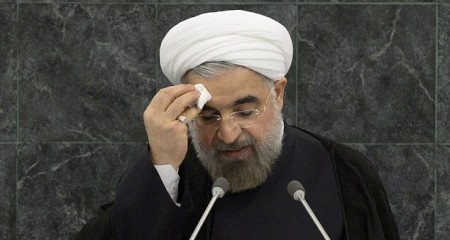LATEST: Iran Rejects US Veto on Choice for UN Ambassador
Reliable EA sources in Iran report that senior clerics have issued a warning to President Rouhani about his promise to open up cultural and media space.
The sources say that Rouhani is hoping to go to Qom, the religious center of Iran, at the start of his second tour of the country. In preparation for the visit, he despatched his Chief of Staff, Mohammad Nahavandian, to the city.
The reception was far from warm. Grand Ayatollahs, including Nasser Makarem Shirazi and Safi Golpayegani, chided Nahavandian over Government initiatives. In particular, they criticized Culture Minister Ali Jannati for declarations that he would open access to the Internet and social media outlets such as Facebook.
The clerics pointedly told Nahavandian that they were disappointed in Jannati, as he was “one of us” — Jannati’s father, Ayatollah Ahmad Jannati, is head of the Guardian Council and a Tehran Friday Prayer leader.
Nahavandian’s response is unknown, as is the status of Rouhani’s proposed trip.
Iran Rejects US Veto on Choice for UN Ambassador
Iran has rejected the US denial of a visa to new Ambassador to the United Nations, Hamid Aboutalebi.
“We do not have a replacement for Mr. Aboutalebi and we will pursue the matter via legal mechanisms anticipated in the United Nations,” Deputy Foreign Minister Abbas Araqchi said.
The White House said on Friday that the visa would not be given to Aboutalebi, who is accused of being a participant in the student takeover of the US Embassy in 1979.
Aboutalebi and student organizers of the occupation have said he was only an occasional translator during the 444-day crisis, in which 52 Americans were held hostage.
Lawyer: Iranian-American Hekmati Given 10-Year Sentence
Amir Hekmati, an Iranian-American detained in August 2011 was given a 10-year sentence in a secret session of a Revolutionary court in December, according to his lawyer.
Hekmati was initially sentenced to death on espionage charges. The sentence was overturned, but he has now been given the 10-year term for “practical collaboration with the American government”.
Attorney Mahmoud Alizadeh Tabatabaei said Hekmati has not informed about the retrial, conviction, or sentence.
Tabatabaei said he learned the news recently in discussions with judiciary officials and told Hekmati by telephone.
Hekmati, a 30-year-old former Marine, was visiting relatives in Tehran for the first time when he was arrested.
In December 2011, Iranian State TV broadcast Hekmati’s “confession”. He denied that he had admitted to spying, writing US Secretary of State John Kerry that the “confession” was “obtained by force, threats, miserable prison conditions, and prolonged periods of solitary confinement”.
Families: Political Prisoners Denied Hospital Treatment
Families of two Iranian political prisoners say they are being denied essential medical care.
Student activist Maryam Shafipour has been denied transfer to a hospital for treatment for heart, stomach, and dental problems, according to relatives.
When the family asked an official the reason for the refusal, he only said, “I decided not to let it happen.”
The family was denied in-person visits with Shafipour during the Iranian New Year from March 21 to April 2. They have been told that the visits are denied because they gave interviews to the media.
Shafipour was arrested in July 2013 and has been given a 7-year sentence for “propaganda against the regime” and “assembly and collusion against national security”.
Prominent human rights lawyer Abdolfattah Soltani has been denied medical care for several months, according to his daughter.
Maedeh Soltani said that on several occasions, transfers from prison to hospital had been arranged but were then blocked for unknown reasons.
The lawyer, arrested in September 2011 and serving a 13-year sentence, has also been denied furloughs for the past three years.
Soltani’s “crimes” including being given the Nuremberg International Human Rights Award in 2009, co-founding the Center for Defenders of Human Rights, and speaking to media.
Oil Exports Surge to Highest Level Since June 2012
Iran’s oil exports have rebounded to 1.65 million barrels per day, their highest level since June 2012.
The International Energy Agency’s monthly report raised February’s estimate by 240,000 bpd.
Preliminary figures for March had estimated Iran’s sales at 1.05 million bpd, but this may also be revised.
Iran’s oil exports were 2.2 million bpd at the start of 2012, but were severely restricted by US-led sanctions, reinforced by blocks on financial transactions and a European Union ban on insurance for oil shipments from July 2012. They dropped to a historic low of less than 800,000 bpd in autumn 2013.
The US has maintained that, despite limited sanctions relief in November’s interim nuclear deal, Iran’s oil exports should not exceed 1 million bpd.
The Obama administration believes that Iran’s oil sales will fall in coming months and average 1 million bpd over the entire six-month period.
State Department spokeswoman Jen Psaki said, “We expect, we still expect, and anticipate that this will average over a six month period…to meeting the bar that was set.”
Psaki said Iranian contributions of oil to Syria, sales of light oil condensates — exempt under sanctions — and high winter demand had boosted the Iranian figures.

